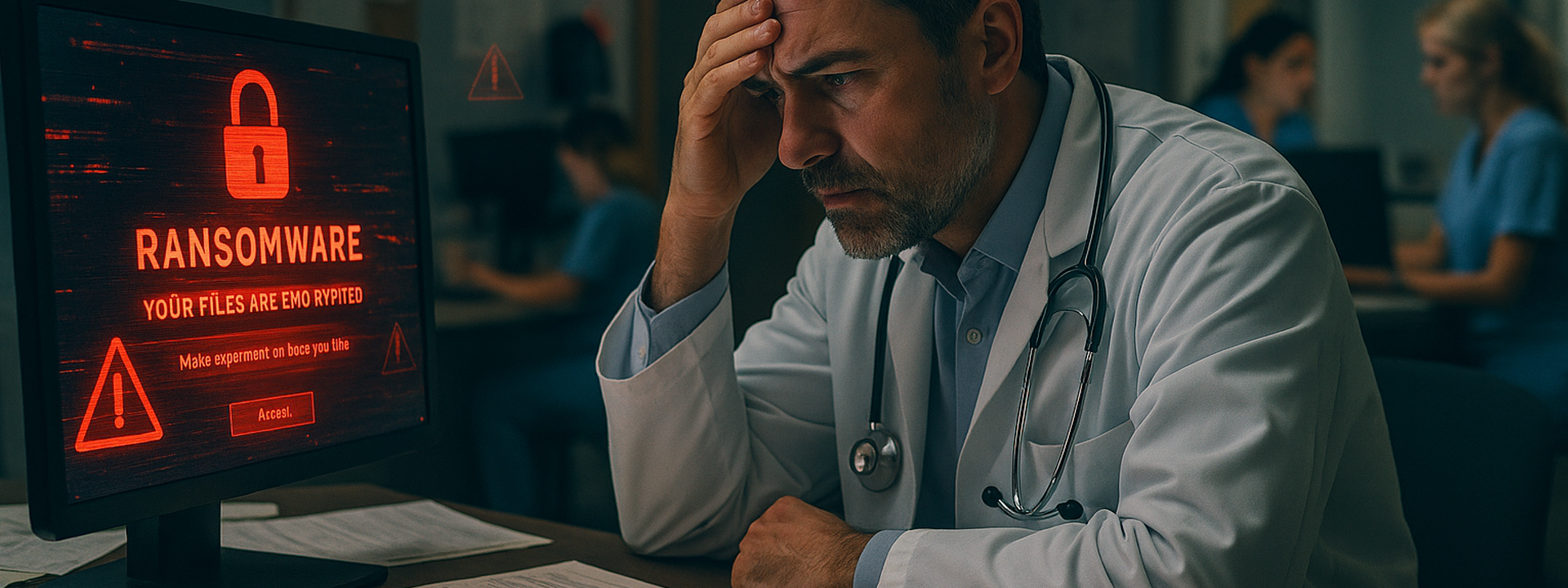
Small health care organizations are under attack. Literally.
While headlines often focus on massive hospital systems, ransomware attackers increasingly target small clinics, practices, and rural hospitals — because they know one thing:
Small health care orgs are less protected… but just as valuable.
💣 What Does a Ransomware Attack Actually Do?
Ransomware is malicious software that encrypts your data — rendering your EHRs, backups, billing systems, email, and schedules totally unusable. Attackers then demand a ransom to restore access.
But even if you do pay (which the FBI strongly advises against):
- You may never get full access back
- Your data could still be stolen or leaked
- Downtime costs in health care can exceed $7,000 per minute
Most importantly? Patient safety and continuity of care are directly affected.
📉 Why Small Health Care Organizations Are Prime Targets
- Lean IT teams juggling multiple responsibilities
- Reliance on manual or outdated backup processes
- Limited cybersecurity tools or budget
- Valuable, regulated data (PHI) that attackers can sell
- Higher likelihood to pay ransoms under pressure
Ransomware doesn’t care how many staff you have. It cares how quickly it can break you.
🔥 Real Small Health Care Organizations That Got Hit
Here’s how it’s already happened — moving from disruption to disaster:
🟡 Woodlawn Dental Center (OH)
- Size: ~20 employees
- Impact: 2 weeks of downtime, manual recovery
- Pain Point: Manual backups slowed everything down
- Result: Business interruption and patient care delays
Source: Fox Business – Ohio dental practice loses 2 weeks
🟠 Grays Harbor Community Hospital (WA)
- Size: ~275 employees
- Impact: Knocked out systems across hospital and clinics
- Result: Delays in care, insurance billing, and patient communication
Source: DataBreaches.net – Grays Harbor ransomware attack
🔴 Allied Physicians of Michiana (IN)
- Size: ~200 employees
- Impact: Encrypted all systems — including EHR and phones
- Result: Weeks of operational slowdown; staff forced to revert to paper
Source: HealthITSecurity – Ransomware Hits Allied Physicians
⚫ St. Margaret’s Health (IL)
- Size: ~300 employees
- Impact: Devastating ransomware attack + financial strain
- Outcome: Permanent closure of the hospital
Source: Becker's Hospital Review – Ransomware cited in closure
🧠 3 Things Every Small Health Care IT Team Should Do Right Now
1. 🔒 Lock Down the Basics — and Whitelist Applications
Every small health care org should have:
- Endpoint protection on all systems
- Strong password + MFA enforcement
- Admin rights restricted
- Application whitelisting
One of the most overlooked — but most powerful — tools in stopping ransomware is Microsoft AppLocker, a built-in Windows feature (Enterprise edition) that lets you define exactly which software is allowed to run on each machine.
No surprises. No unapproved apps. No malware posing as trusted software.
AppLocker stops ransomware before it starts — by blocking unknown executables from ever running.
If you’re not using AppLocker today, visuaFUSION can help:
- 📄 We provide Microsoft Enterprise licensing to qualified small health care orgs
- ⚙️ We assist with planning, implementation, and policy creation for AppLocker
- 🛡️ We help you reduce endpoint risk without disrupting your workflows
💬 Takeaway for Leadership: Ask your IT resource:
“What application whitelisting or execution controls do we have in place today?” If the answer is “none” or “we're not sure,” it’s time to dig in — and possibly modernize.
2. 🗂️ Automate Your Backup Strategy
Manual, local-only backups are not enough.
You need:
- Automated, scheduled backups - your resilience strategy shouldn't be able to call in sick
- Fast Onsite backup, with offsite and/or cloud-based replication (like Amazon S3)
- Fast full system and file-level recovery
One proven solution: Quest Rapid Recovery. It’s fast, ransomware-resilient, and purpose-built for health care recovery needs.
💬 Takeaway for Leadership: Ask your IT resource:
“How are our backups managed today — and how quickly could we recover from a ransomware attack?” Understanding where you are now helps you map a path to resilience.
3. 🤝 Partner With Experts Who Understand Small Health Care IT
You’re not a small business when it comes to compliance. You’re health care. That means:
- Regulations still apply
- Risk still exists
- The stakes are still high
At visuaFUSION Systems Solutions, we help small health care teams:
- Replace manual processes
- Eliminate expensive bolt-on tools
- Automate compliance-driven IT tasks
- Reclaim time, control, and confidence
You don’t have to do it all yourself — but you do need a partner who gets your environment.
💬 Takeaway for Leadership:
Consider working with a strategic IT partner who specializes in small health care. Not just for tech — but for time, compliance, and peace of mind.
🔗 Schedule a quick discovery call or learn more
Need to tighten up your ransomware defenses, but don’t know where to start? Let’s fix that — together.